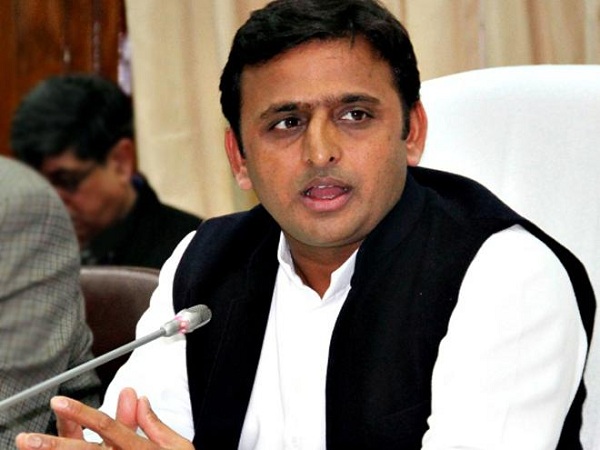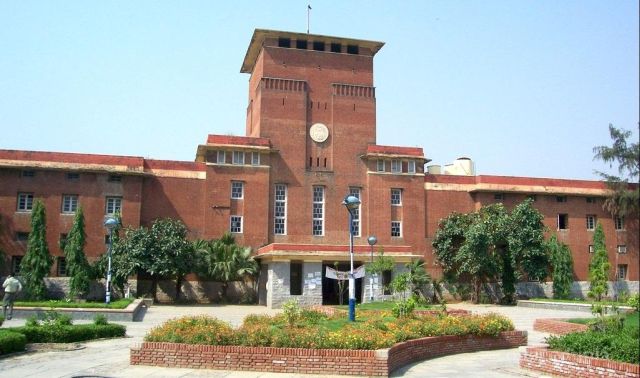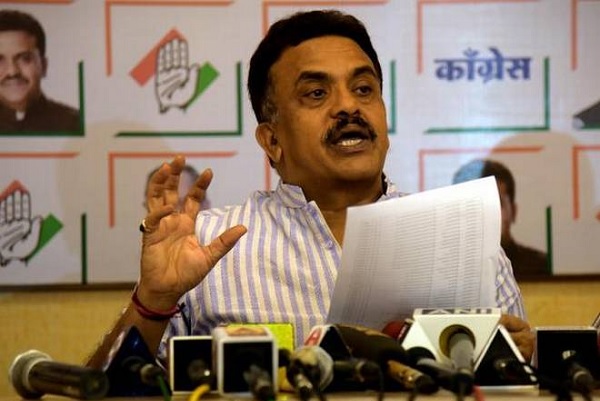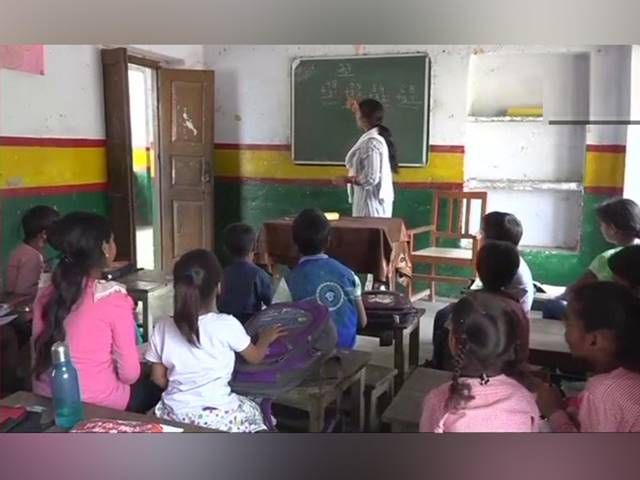
by admin | May 25, 2021 | News, Politics
 Lucknow : Former Uttar Pradesh Chief Minister Akhilesh Yadav had arbitrarily given away the coveted “Yash Bharti” awards to 53 persons, in contravention to the laid down rules for selection of awardees, according to an RTI response.
Lucknow : Former Uttar Pradesh Chief Minister Akhilesh Yadav had arbitrarily given away the coveted “Yash Bharti” awards to 53 persons, in contravention to the laid down rules for selection of awardees, according to an RTI response.
As per the information given by the state Culture Department, in response to an RTI poser by activist Nutan Thakur, the “Screening Committee” had recommended 54 names for the award at its October 20, 2016 meeting. The names were forwarded to then Chief Minister Akhilesh Yadav by Culture Minister Aruna Kumari Kori.
Yadav, however, dropped the name of Shamimuddin of Agra for Zardozi art without stating any reason and added 23 new names. Of these, four names were written by hand, in completely arbitrary manner without any basis or recommendation, revealed the RTI response.
Similarly, the Samajwadi Party (SP) chief added 12 new names including a “handwritten” inclusion of a certain Shadab Ruwaidi. This was followed by addition of 11 new names, including that of IAS Suhas L.Y. on November 29, 2016, and seven names on December 19, 2016.
“This is a classic example of misuse of authority by public functionaries,” the petitioner told IANS on Wednesday.
Yash Bharti is the highest award by the government of Uttar Pradesh and was instituted in 1994 by then Chief Minister Mulayam Singh Yadav for eminent personalities in the fields of literature, social work, medicine, film, science, journalism, handicrafts, culture, education, music, drama, sports, industry and astrology.
It carries a citation and a cash award of Rs 11 lakh and a Rs 50,000 pension per month.
—IANS

by admin | May 25, 2021 | News
 By Vishal Narayan,
By Vishal Narayan,
New Delhi : The Delhi University earned over Rs 3 crore in fees paid by students for either revaluation or rechecking their answer-sheets and for providing photocopies of answer-sheets to them between 2015-16 and 2017-18, an RTI has revealed.
According to the information provided by the university, it earned Rs 2,89,12,310 for revaluation alone between 2015-16 and 2017-18.
During the same period, it earned Rs 23,29,500 for rechecking and Rs 6,49,500 for providing students copies of answer-scripts evaluated.
As per university rules, students have to shell out Rs 1,000 for revaluation of a single copy and Rs 750 for rechecking of the answer-script — which means only re-totalling of the marks — and same amount has to be paid for obtaining photocopy of answer-script also.
The information regarding the income generated was given by the varsity in response to an RTI application filed by a former Delhi University student, who had demanded that he be allowed the inspection of his answer-script free of cost as per a certain RTI section which allows inspection of public records.
“I had filed an RTI seeking inspection of my answer-script in 2016. My plea dragged on for two years and I had to take recourse to the CIC (Central Information Commission), which ordered the university to let me inspect the answer-script as per RTI’s Section 2(j).
“The university is yet to allow me the inspection of my answer-script. It has said it will pursue the matter further at the high court,” the former law student told IANS.
The RTI Section 2(j) lays down that a person can access records kept under any public authority for, among other purposes, “inspection… taking notes, extracts”.
The applicant said had he been allowed the inspection of his answer-script, and in case any discrepancy found, he would have asked for the re-totalling/ revaluation to be done by the university free of charge, since he is not bound to pay for the mistakes made by the university.
“This is a grave issue of public interest. Not every one is rich enough to spend Rs 1,000 or Rs 750 for revaluation. Also logically, if discrepancy is found, the university should be duty-bound to correct it without cost… They (university administration) are making students pay for the mistakes they made,” he said.
The Central Information Commission (CIC) in its August 18 decision had ordered the Delhi University to allow the applicant inspection of his answer copy in “larger public interest”.
“… The Commission felt that issue under consideration involved larger public interest affecting the fate of all students who wish to obtain information regarding their answer-sheet/ marks.
“Hence allowing inspection of their own answer sheets to the students ought to be allowed as per the provision of the RTI Act, 2005,” the Commission said, adding that the applicant be allowed the inspection of his answer-sheets within 15 days of this letter.
When he was not allowed the inspection of his answer-sheet even after the CIC decision, the former DU student approached the Public Information Officer of the university later in the month through another RTI, who told him that the university’s Examination Branch (which keeps the answer-sheets) has decided to challenge the verdict.
Earlier, before the CIC, the university officials had contended against allowing of inspection of answer-sheets as per the RTI Act provisions, saying that doing so “would render their existing mechanism of providing hard copies…redundant”.
“The Respondent…apprehended that allowing inspection of files would render their own mechanism of providing certified copy of answer-scripts as per the fee prescribed in their regulations as meaningless, since the candidates would would certainly opt for inspection as per…RTI Act, 2005,” the CIC noted in its verdict.
(Vishal Narayan can be contacted at vishal.n@ians.in)
—IANS

by admin | May 25, 2021 | News, Politics

Mumbai Congress President Sanjay Nirupam (Photo Credit: The Hindu)
Mumbai Congress President calls Devendra Fadnavis a poor example for the Mumbaikars to follow
By Maeeshat.in,
Mumbai: Mumbai Congress President Sanjay Nirupam today questioned Maha CM Devendra Fadnavis after two vehicles owned by the latter were listed among those in the unpaid fines list as per the report prepared by an RTI Activist Shakil Ahmed Shaikh.
Sanjay Nirupam said, “Maha CM Devendra Fadnavis is losing face by not obeying the traffic rules of the city himself. He has set an extremely poor example for the common man to follow. How can he and his Govt force the people to obey rules and pay fines if they’ve been conveniently breaking the same for their own benefits?”
“The Mumbai Traffic Police ensure that the e-challans reach the concerned person who breaks traffic rules in any way. But it looks like the CM and his aides have decided to turn a blind eye to these rules and the law of the land in general. The two cars owned by the CM have broken traffic rules 13 times between a time period of January and August 2018. He owns the State a fine amount worth Rs. 13,000. He has a fair share in the total amount of Rs. 119 Crore which is yet to reach the Govt by those who have broken traffic rules of the city. How can he urge the common man to pay fines if he has been refraining from doing so in the first place?”, asked Mr. Nirupam.
Along with the CM, other famous Mumbaikars who have made it to the traffic police’s list of offenders include Maharashtra’s Transport Minister Diwakar Raote, Yuva Sena President Aditya Thackeray, MNS Chief Raj Thackeray and Salman Khan among others.

by admin | May 25, 2021 | News, Politics
 By Nivedita Singh,
By Nivedita Singh,
New Delhi : Nearly 600 of Delhi’s government schools are running headless — some of them for the past six years — according to an RTI reply, and the ruling Aam Aadmi Party (AAP) blames the central governments neglectful attitude for this “serious issue”.
According to the information sought under the Right to Information (RTI) Act, there are 918 posts of principals in 1,024 Delhi government schools. Some 106 schools don’t have such posts. Out of 918 posts of principals, 595 are lying vacant, the reply revealed.
It said 768 vice principals are holding the charge of the head of the school “due to principals not physically working or some schools have(ing) no post of principal”.
“As on July 12, 595 posts of principals are vacant out of 918,” it said. And of 323 principals, 71 have been re-employed after their superannuation.
In most of the schools, the post is vacant for more than a year and some have not had principals for the past several years.
For example, in the Sarvodaya Kanya Vidyalaya No. 2, in Madipur, the vice principal has been holding charge since December 2012.
Sarvodaya Co-ed Senior Secondary School in Jaidev Park and Government Girls Senior Secondary School in Samaipur have had no principals in the last four years.
Similarly, it has been more than three years since Government Sarvodaya Bal Vidyalaya in Subhash Nagar had a principal.
In Government Girls Senior Secondary School No 1, Tilak Nagar, the post has been vacant since June 2015.
The post of the principal has been vacant at Government Boys Senior Secondary School No. 1 in J.J. Colony Khyala and Government Co-ed Senior Secondary School at Ghogha since 2016.
Sarvodaya Kanya Vidyalaya No.3 in Tilak Nagar, Sarvodaya Kanya Vidyalaya in Shalimar Bagh and Government Sarvodaya Bal Vidyalaya (Ved Pandit Khushi Ram) in Nangal Thakran have not had principals for the last two years.
In some zones, the posts have been lying vacant in almost all the schools there for more than a year now. For example, of the 14 schools in Zone 28 (central Delhi), 13 are without principals. In Zone 3 (east Delhi), of the total 27 schools, 19 are without principals.
Similar is the situation in Zone 19 (southwest Delhi) where out of 17 schools, 12 are running without principals. In Zone 20 (southwest Delhi), out of 24 schools, 13 have no principals and in Zone 27 (central Delhi), of the total 25 schools, 12 are without principals.
This, despite the fact that education has been one of the priorities of the AAP government which allocated 26 per cent of its budgetary expenses for education in Delhi. But the recruitment of principals in Delhi government schools is done by the Union Public Service Commission.
The reforms undertaken by the Arvind Kejriwal government in the city have won non-partisan global praise.
Asked about the huge number of vacant principal posts, AAP leader Atishi Marlena said the recruitment is a matter of Services that is being currently looked after by the Lieutenant Governor — the central government’s representative on administrative affairs of the national capital.
“Lack of principals is a serious issue. The matter is out of our hands. We, in the past two-three years, have raised this point before the LG, who holds the charge of Services,” Marlena, former advisor on education to the Delhi government, told IANS.
(Nivedita Singh can be contacted at nivedita.singh@ians.in)
—IANS

by admin | May 25, 2021 | Corporate, Corporate Governance, News, Politics
 By Quaid Najmi,
By Quaid Najmi,
Mumbai : A district cooperative bank, which has Bharatiya Janata Party (BJP) President Amit Shah as a director, netted the highest deposits among such banks of old Rs 500 and Rs 1,000 notes that were abruptly demonetised on November 8, 2016, according to RTI replies received by a Mumbai activist.
The Ahmedabad District Cooperative Bank (ADCB) secured deposits of Rs 745.59 crore of the spiked notes — in just five days after Prime Minister Narendra Modi made the demonetisation announcement. All the district cooperative banks were banned from accepting deposits of the banned currency notes from the public after November 14, 2016, — five days after demonetisation — on fears that black money would be laundered through this route.
According to the bank’s website, Shah continues to be a director with the bank and has been in that position for several years. He was also the bank’s chairman in 2000. ADCB’s total deposits on March 31, 2017, were Rs 5,050 crore and its net profit for 2016-17 was Rs 14.31 crore.
Right behind ADCB, is the Rajkot District Cooperative Bank, whose chairman Jayeshbhai Vitthalbhai Radadiya is a cabinet minister in Gujarat Chief Minister Vijay Rupani’s government. It got deposits of old currencies worth Rs 693.19 crore.
Interestingly, Rajkot is the hub of Gujarat BJP politics — Prime Minister Modi was first elected from there as a legislator in 2001.
Incidentally, the figures of Ahmedabad-Rajkot DCCBs are much higher than the apex Gujarat State Cooperative Bank Ltd, which got deposits of a mere Rs 1.11 crore.
“The amount of deposits made in the State Cooperative Banks (SCBs) and District Central Cooperative Banks (DCCBs) — revealed under RTI for first time since demonetisation — are astounding,” Manoranjan S. Roy, the RTI activist who made the effort to get the information, told IANS.
The RTI information was given by the Chief General Manager and Appellate Authority, S. Saravanavel, of the National Bank for Agriculture & Rural Development (NABARD).
It has also come to light, through the RTI queries, that only seven public sector banks (PSBs), 32 SCBs, 370 DCCBs, and a little over three-dozen post offices across India collected Rs 7.91 lakh crore — more than half (52 per cent) of the total amount of old currencies of Rs 15.28 lakh crore deposited with the RBI.
The break-up of Rs 7.91 lakh crore mentioned in the RTI replies shows that the value of spiked notes deposited with the RBI by the seven PSBs was Rs 7.57 lakh crore, the 32 SCBs gave in Rs 6,407 crore and the 370 DCCBs brought in Rs 22,271 crore. Old notes deposited by 39 post offices were worth Rs 4,408 crore.
Information from all the SCBs and DCCBs across India were received through the replies. The seven PSBs account for around 29,000 branches — out of the over 92,500 branches of the 21 PSBs in India — according to data published by the RBI. The 14 other PSBs declined to gave information on one ground or the other. There are around 155,000 post offices in the country.
Fifteen months after demonetisation, the government had announced that Rs 15.28 Lakh crore — or 99 per cent of the cancelled notes worth Rs 15.44 lakh crore — were returned to the RBI treasury.
Roy said it was a serious matter if only a few banks and their branches and a handful post offices, apart from SCBs and DCCBs, accounted for over half the old currency notes.
“At this rate, serious questions arise about the actual collection of spiked notes through the remaining 14 mega-PSBs, besides rural-urban banks, private banks (like ICICI, HDFC and others), local cooperatives, Jankalyan Banks and credit cooperatives and other entities with banking licenses, the figures of which are not made available under RTI,” he said.
The SCBs were allowed to exchange or take deposits of banned notes till December 30, 2016 — for a little over seven weeks, in contrast to district cooperative banks which were allowed only five days of transactions.
The prime minister during his demonetisation speech had said that Rs 500 and Rs 1,000 notes could be deposited in bank or post office accounts from November 10 till close of banking hours on December 30, 2016, without any limit. “Thus you will have 50 days to deposit your notes and there is no need for panic,” he had said.
After an uproar, mostly from BJP allies, the government also opened a small window in mid-2017, during the presidential elections, allowing the 32 SCBs and 370 DCCBs — largely owned, managed or controlled by politicians of various parties — to deposit their stocks of the spiked notes with the RBI. The move was strongly criticised by the Congress and other major Opposition parties.
Among the SCBs, the Maharashtra State Cooperative Bank topped the list of depositors with Rs 1,128 crore from 55 branches and the smallest share of Rs 5.94 crore came from just five branches of Jharkhand State Cooperative Bank, according to the replies.
Surprisingly, the Andaman & Nicobar State Cooperative Bank’s share (from 29 branches) was Rs 85.76 crore.
While Maharashtra has a population of 12 crore, Jharkhand’s population is 3.6 crore. Andaman & Nicobar Islands have less than four lakh residents.
The poorest of all the cooperative banks in the country is Banki Central Cooperative Bank Ltd in Odisha, which admitted to receiving zero deposits of the spiked currency.
Of the total 21 PSBs, State Bank of India, Bank of Baroda, Bank of Maharashtra, Central Bank of India, Dena Bank, Indian Overseas Bank, Punjab & Sindh Bank, Vijaya Bank, Andhra Bank, Syndicate Bank, UCO Bank, United Bank of India, Oriental Bank of Commerce, and IDBI Bank (14 banks) — with over 63,500 branches amongst them — did not give any information on deposits.
—IANS

 Lucknow : Former Uttar Pradesh Chief Minister Akhilesh Yadav had arbitrarily given away the coveted “Yash Bharti” awards to 53 persons, in contravention to the laid down rules for selection of awardees, according to an RTI response.
Lucknow : Former Uttar Pradesh Chief Minister Akhilesh Yadav had arbitrarily given away the coveted “Yash Bharti” awards to 53 persons, in contravention to the laid down rules for selection of awardees, according to an RTI response.



